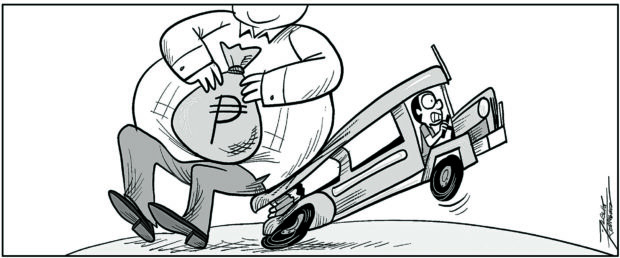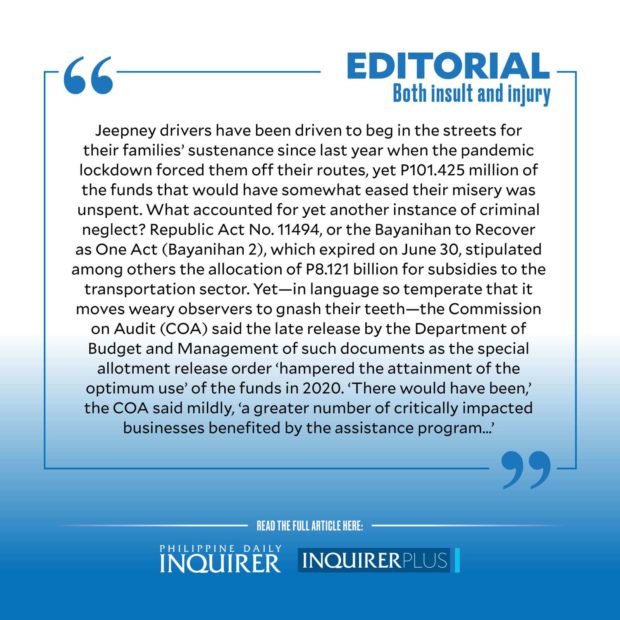Both insult and injury

To illustrate yet again the absurdity of life in these parts, comes news of a lawmaker’s wedding described as “lavish” and “ostentatious.” Rep. Claudine Bautista recently got hitched to her childhood buddy wearing a gown said to cost an arm and a leg, in a ceremony held with much pomp on the exclusive island of Balesin.
It wouldn’t have been too much of a shock in this nation of extremes (billionaire families listed among the world’s richest and millions of impoverished children stunted by hunger). But the blushing bride happens to represent the party list group Drivers United for Mass Progress and Equal Rights (or, uh, Dumper), drivers whose current suffering she seemed blissfully unaware of, or she would have thought twice about displaying the wealth and privilege of both her family and the one she married into, as well as the breathtaking expense to pull off the occasion.
Article continues after this advertisementOr maybe not. Maybe her cluelessness was such that she saw no injustice, not even insensitivity, in the whole shebang, and later wondered why they were at the receiving end of volleys of criticism. Among the wedding sponsors, after all, was former president and speaker Gloria Macapagal Arroyo, whose own son once purported to represent security guards under the party list group Ang Galing Pinoy, with one miserable bill to his name. The Balesin wedding party succeeded in yet again proving how powerful families have gamed the party list system for their lasting benefit.
At any rate, Bautista’s pandemic-pummeled constituents are among those dealt both insult and injury by the Department of Transportation (DOTr), which has failed to fully use its P9.5-billion COVID-19 intervention budget primarily due to delayed fund releases. Jeepney drivers have been driven to beg in the streets for their families’ sustenance since last year when the pandemic lockdown forced them off their routes, yet P101.425 million of the funds that would have somewhat eased their misery was unspent. What accounted for yet another instance of criminal neglect?
Republic Act No. 11494, or the Bayanihan to Recover as One Act (Bayanihan 2), which expired on June 30, stipulated among others the allocation of P8.121 billion for subsidies to the transportation sector. Yet—in language so temperate that it moves weary observers to gnash their teeth—the Commission on Audit (COA) said the late release by the Department of Budget and Management of such documents as the special allotment release order “hampered the attainment of the optimum use” of the funds in 2020. “There would have been,” the COA said mildly, “a greater number of critically impacted businesses benefited by the assistance program…”
Indeed. But the DOTr under Secretary Arthur Tugade was reported as saying that the pandemic-imposed restrictions — even, incredibly, the disinfection of documents—also got in the way of the movement and signing of the necessary papers. If this were true, then the problem is glaring: the absence of foresight, clear and innovative thinking, and astute management of time and resources among responsible officials vis a vis public utility drivers now living on the knife’s edge and who now depend on their sound decision-making for survival. Like Dumper Rep. Claudine Bautista and her ilk, these officials are willfully ignorant of life-and-death issues and cannot be expected to do right by their constituencies. Of what use are they in their lofty posts then?
The COA has also called out the Land Transportation Franchising Regulatory Board (LTFRB) chaired by Martin Delgra III for its delayed distribution of one-time cash subsidies of P6,500 for drivers of PUVs. Of the P1.161-billion direct cash subsidy, only P839.52 million was disbursed to 129,157 beneficiaries as of December 2020, leaving 49,097 drivers waiting for nothing. How can this happen? And why? We’re not even beginning to talk about the service contracting program that required the daily payments of certain amounts to jeepney and bus drivers if specified kilometer thresholds were met—but which was marked, to the drivers’ infuriating disadvantage, by glitches in GPS tracking and network connections, and the entry of wrong route data in the system. It doesn’t seem like Sen. Nancy Binay was exaggerating when she identified the “invisible” DOTr and LTFRB as “the single biggest job stranglers since the start of the pandemic.”
And here’s what the International Labour Organization reported: The Philippines’ work force fared poorest in the 10-member Association of Southeast Asian Nations in 2020, suffering “the largest working-hour losses” at 13.6 percent compared to 4.3-4.5 percent in Thailand, Brunei, and Laos. The numbers are clear in this country trapped in one of the world’s longest running lockdowns.

















